#Fiston Mwanza Mujila
Text
Indie-Perlen in Bücherfluten
Vor, während und nach der Frankfurter Buchmesse waren Zeitungen und Radiosender voller Buchtipps. Aber irgendwie stieß man überall auf die gleichen Titel und Debatten. Hier finden Sie einige lesenswerte Bücher aus unabhängigen Verlagen, die mehr Aufmerksamkeit verdient haben.
Continue reading Untitled
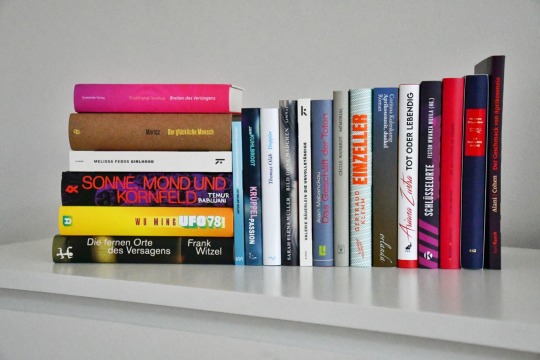
View On WordPress
#Alain Mabanckou#Alfred-Döblin-Preis#Anne Weber#Annette von der Weppen#Anton Artibilov#Ariana Zustra#Cécile Wajsbrot#César Aira#Christa Nebenführ#Corinna Kuhlenkamp#Deutscher Buchpreis#Dietmar Dath#featured#Feurat Alani#Fiston Mwanza Mujila#Frank Schätzing#Frank Witzel#Gertraud Klemm#Giwi Margwelaschwili#Holger Fock#Internationaler Literaturpreis#Jan Kuhlbrodt#Katerina Poladjan#Katharina Meyer#Katja Oskamp#Klaus-Peter Arnold#Lena Müller#Léonard Cohen#Matthew Phipps Shiel#Melissa Febos
0 notes
Text
A snapshot of Fiston Mwanza Mujila’s Weltwortreisende 2022 in Austria.
A snapshot of Fiston Mwanza Mujila’s Weltwortreisende 2022 in Austria.
Weltwortreisende 2022 (World Word Travellers), organised by Fiston Mwanza Mujila and Robert Reithofer, was hosted in Graz, Austria from October 20 – 22, 2022.
Weltwortreisende (World Word Travellers) or Transnational Literary Days, running for the second year, are not only a crossroads for literature, but also a meeting point for languages and representations of the world. Discussed at the event…

View On WordPress
0 notes
Text

The sky weeps crocodile tears
it cries, it weeps, it cries, and it stops
it cries, it weeps, it cries, and it stops.
it cries, it weeps, it cries, and it stops...
the rain ...
a sheen of poetry to beat back
the burning sun
of these last days
- Fiston Mwanza Mujila
12 notes
·
View notes
Text
to each their own way of grazing on life,
i refuse to sip daintily from a spooni gnaw, chew, suck and smoke it
until it becomes feces and dust
between my uncircumcised cannibal jaws - Fiston Mwanza Mujila (DRC)
9 notes
·
View notes
Text


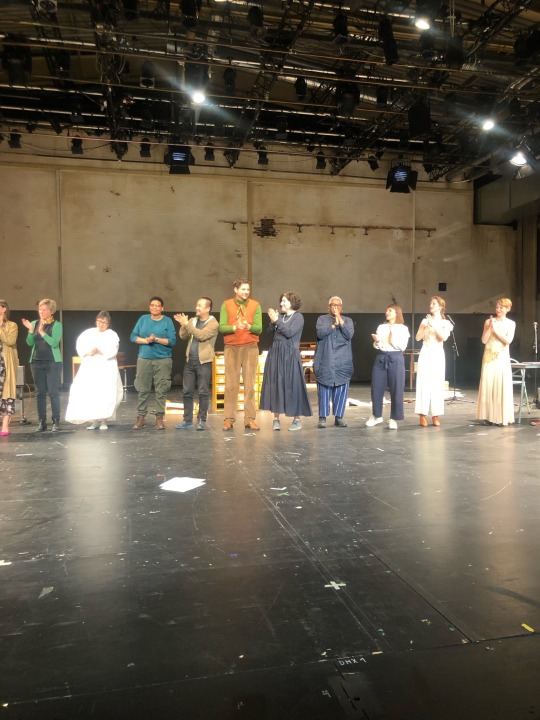
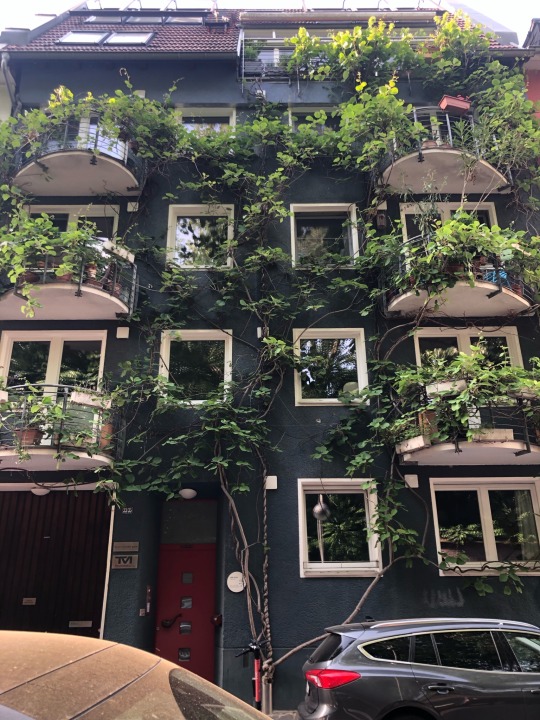

Between the Asychronicity symposium I was able to walk Cologne from end to end, along the Rhine River at sunset, stopping by the Cologne Cathedral, arriving in time to catch the last event of the Poetica festival, which concluded with the Sounding Archive multimedia performance featuring the poets Ain Bailey (Great Britain), Don Mee Choi (USA), Yan Jun (China), Mihret Kebede (Ethiopia), Valzhyna Mort (Belarus), Fiston Mwanza Mujila (Congo), Carlos Soto-Román (Chile), Maria Stepanova (Russia), Anja Utler (Germany), and curator Uljana Wolf (Germany). Don Mee Choi wore a dress of paper. The whole experience activated something ancient in my brain.
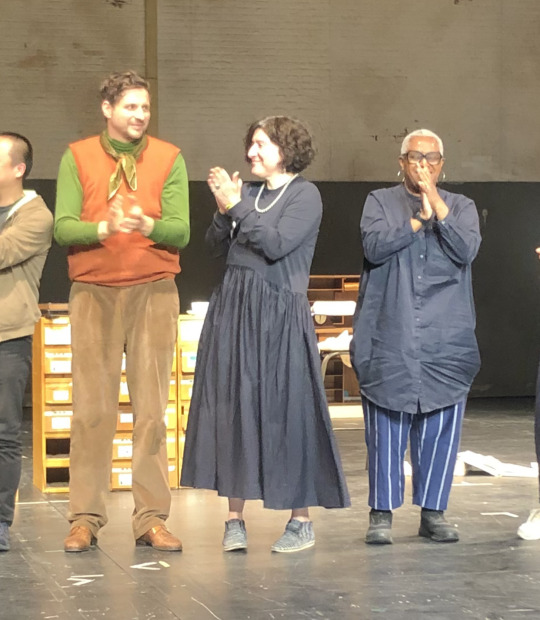
QUEEN! Maria Stepanova with her drop waist dress, pearls and tousled mop of hair felt straight out of the 19th century. Despite the poison of the war, I still love the sound of Russian, its sensuousness when spoken to the birds.
9 notes
·
View notes
Text
Lecteurs engagés
Au cœur de l’ivresse des mots
En lien avec la journée mondiale du livre qui se tiendra mardi 23 avril 2024, la Cène littéraire, le cercle littéraire « Le conceptualiste » et le CERIL ont offert un moment d’ivresse intellectuelle aux étudiants de l’université de Douala samedi dernier au campus 2 dans la salle Madiba.
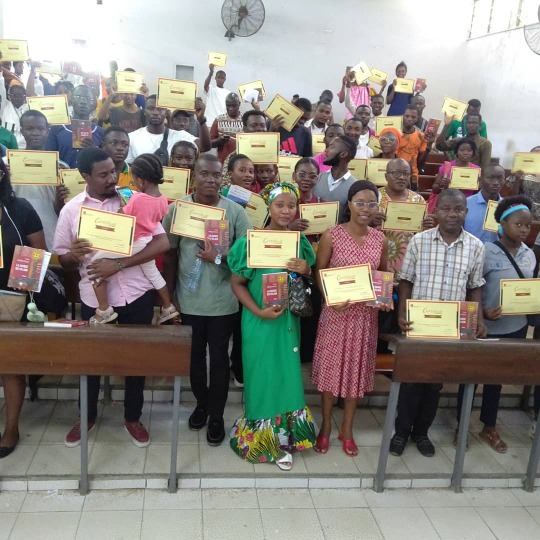
Il est 11h lorsque l’amphithéâtre « MBAPE MADIBA » de la Faculté de Droit et de Science Politique est comble. L’excitation se lit sur les visages. On se croirait à une séance de distribution de la prime de l’Excellence. Que non ! L’œil curieux est vite attiré par ce livre que chaque étudiant tient fièrement : La danse du vilain, dernier chef-d’œuvre du jeune, et non moins talentueux écrivain congolais, Fiston MWANZA MUJILA. Vous ne rêvez pas. Tous ces jeunes sont bien là pour assister à un café…littéraire ! Ce rendez-vous intellectuel est l’œuvre de la promotrice culturelle Flore ZOA. Son partenaire pour la ville de Douala, Moktar NJUMOUN, tient lieu de modérateur de l’événement. À ses côtés, la représentante de la Faculté de Droit et de Science Juridique (Dr Clémentine KABADIANG Épse ENGONO), le président de l’association J.E.U.N.E.S (M. Joseph MBONE) et un spécialiste de littérature francophone (Dr Albin Nelson HOUACK). Pendant deux heures, ils ont entretenu des étudiants issus de toutes les facultés, des enseignants, des auteurs en herbe et des éditeurs.
Entre impressions de lecture, analyses critiques du roman et quizz littéraire, tous les participants ont découvert et redécouvert la plume alléchante et croustillante de MWANZA MUJILA, Prix littéraire Les Afriques 2021. Et que dire de l’ambroisie communiée à ce rendez-vous du « donner » et du « recevoir » ?

Dans un style empreint de réalisme magique, d’une satire maitrisée et d’une ouverture généreuse aux autres textes et médias, le romancier nous transporte dans le Zaïre du maréchal Mobutu. Entre chaos politique, course au diamant et débauche, trois figures d’adolescents émergent : Sanza, Molakisi et Ngungi. Issus de familles dysfonctionnelles, à l’image des structures sociopolitiques du récit, ils côtoient, progressivement, les arcanes des services de renseignements, les mines de diamants et les cercles magico-religieux, le tout sur un fond de rumba congolaise agrémenté d’un humour corrosif. Et puisque le temps ne suspend jamais son vol, et puisque les belles choses ont toujours une fin, c’est avec la promesse de se retrouver autour d’un autre cocktail de mots que les participants se sont quittés sur les coups de 13 heures. Au Cameroun, il n’y a donc pas que la jeunesse des débits de boissons. Il y a surtout cette jeunesse qui croit en cette pensée de Mongo Béti : « La lecture est le plus grand ferment de l’intelligence ».
Albin Nelson Georges Houack
0 notes
Text
Monumental sadness: Geneva theatre takes on DRC-Glencore injustice
The global premiere of Justice at the Grand Theatre of Geneva this week proved a slap in the face as much as a creative coup taking opera into uncharted territory. If you think that opera is just an out-dated form of elite entertainment, Justice will ask you to think again. This modern spectacle shines a harsh light on Switzerland-based commodity traders who thrive in lakeside luxury at the expense of people whose struggles in sun-scorched and rain-battered lands remain largely invisible to the international public. It is foremost a cry for justice – complete with a conscious-clearing crowdfunding opportunity – for the victims of an atrocious acid truck accident that left 21 dead and survivors completely disfigured in the Democratic Republic of Congo. Death, disfigurement, dignity and thwarted justice are leitmotifs in this opera by Catalan composer Hector Parra, Swiss stage director Milo Rau and Congolese librettist Fiston Mwanza Mujila. This global collaboration examines... https://www.swissinfo.ch/eng/business/monumental-sadness--geneva-theatre-takes-on-drc-glencore-injustice/49155024?utm_campaign=swi-rss&utm_source=multiple&utm_medium=rss&utm_content=o (Source of the original content)
0 notes
Quote
I don’t live in exile / exile lives in me
— Fiston Mwanza Mujila, from “SOLITUDE 12,” The River in the Belly, tr. J. Bret Maney
#quote#Fiston Mwanza Mujila#poetry#The River in the Belly#out of my collection#SOLITUDE 12#J. Bret Maney
2K notes
·
View notes
Quote
«Sono storico di formazione. A meno di non sbagliarmi, penso che la letteratura si meriti un ruolo di primo piano nell'elaborazione della storia. Solo attraverso la letteratura posso ristabilire la verità. Io mi prefiggo di ricostituire la memoria di un paese che esiste solo sulla carta. Fantasticare sulla Città-Paese e sull'Entroterra nella prospettiva di un viaggio a ritroso nella memoria... I personaggi storici sono i fari. Ma gli anatroccoli, gli scavatori, gli studenti famelici, i turisti e i...»
«Questo discorso l'ho già sentito... Nella letteratura africana ne abbiamo già abbastanza di miseria, povertà, sifilide e violenza. Guardati attorno. Ci sono belle ragazze, begli uomini, buona musica, la birra di Brazza... Ma non t'ispira tutto questo? Sono preoccupato per l'avvenire della letteratura africana in generale. Nel romanzo africano il personaggio principale è sempre scapolo, nevrotico, perverso, depresso, senza figli, senza tetto e con tutti i debiti di questo mondo. Qui la gente vive, scopa, è felice... Si deve scopare anche nella letteratura africana!»
Lucien approfittò della verve del suo interlocutore per bersi la sua prima birra. Sollevando il bicchiere intravide le due ragazze che lo avevano adocchiato la sera prima. Il poveraccio azzardò un gesto amichevole. Le ragazze-madri presero il gesto per un segnale e scesero senza farsi pregare.
Fiston Mwanza Mujila, Tram 83, Nottetempo, 2015 (traduzione di Camilla Diez); pp. 58-59.
[ Ed.ne or.le: Tram 83, roman, Paris, Éditions Métailié, 2014 ]
#Fiston Mwanza Mujila#Tram 83#Nottetempo#Camilla Diez#letteratura#letteratura africana#letteratura africana contemporanea#Africa#Congo#RDC#Repubblica Democratica del Congo#Zaire#ex-Zaire#itazioni letterarie#libri#citazioni#narrativa#narrativa africana contemporanea#narrativa africana#letture#citazioni letterarie#romanzo#romanzi#vita#felicità#gioia#allegria#gioia di vivere#Africa equatoriale#Kinshasa
1 note
·
View note
Text
The River in the Belly by Fiston Mwanza Mujila
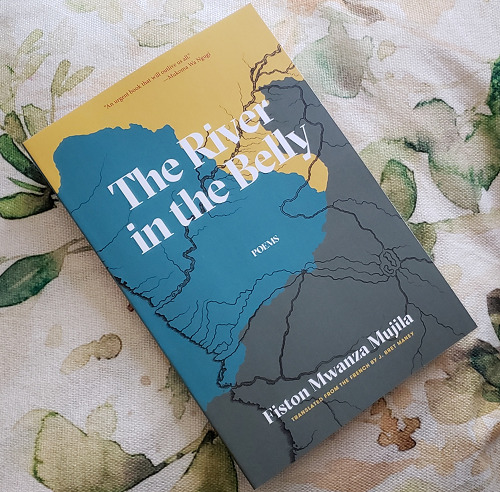
poetry (let’s say) the dream is all we still have in this time of crisis…
Born in the far south of the Democratic Republic of Congo, Fiston Mwanza Mujila is a writer and educator who over the last several years, among other honors, has gained prominence for his debut novel Tram 83. (English edition trans. Roland Glasser.) Yet, with an oeuvre that is varied, besides short stories and plays, poetry is the form where he began. A backbone where it might be argued Mujila is also at his most. Readers indeed can thank Asymptote Journal in previous years for publishing some of this poetry in English translation by J. Bret Maney. Now not just excerpts but the whole collection of The River in the Belly is offered from indie publisher Deep Vellum through imprint Phoneme Media. The Congo River, history, violence, exile, nature, man, and bible verses all saturate punchy, jazzy abraded ‘solitudes’ as quick but tugging as a single line or flowing across pages. With a complexity too, as much of Mujila’s writing, the back includes an assortment of notes. An especially helpful aid with the Lingala and Swahili spattered across the work. Those lingua franca among the six languages, Mujila, writes in. Too, the collection originally appeared in a bilingual French/German edition (trans Ludwig Hartinger) in Austria where Mujila has lived for many years. Like in the verve of different languages, some works may survive on the page fine, but I imagine Mujila’s verse best alive when at a poetry slam. However, thanks to the Transnational Literature Series at Brookline Booksmith you can further experience his recitals during a celebratory event of the collection with two of his translators and editor David Shook.
The River in the Belly by Fiston Mwanza Mujila is available in English translated by J. Bret Maney, in print and digital from Phoneme Media
#poetry#the river in the belly#fiston mwanza mujila#Le Fleuve dans le Ventre#world poetry day#congo river#Francophone Writers From 50+ Lands#Francophone50#beat the backlist
0 notes
Text
Schreiben statt Verschweigen
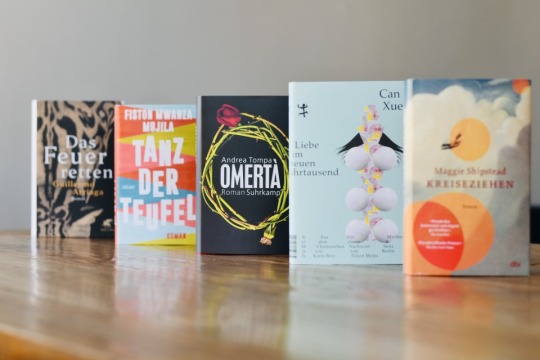
In den Eruptionen der Gegenwart spiegeln sich meist die Abgründe der Vergangenheit. Dabei führen die Romane des Sommers von Andrea Tompá, Can Xue, Fiston Mwanza Mujila, Maggie Shiptstead und Guillermo Arriaga in fünf Kontinente, durchqueren Zeiten und Welten und überzeugen dank wunderbarer Übersetzungen mit höchster Sprachkunst.
Read the full article
#AlejandroGonzálezIñárritu#AndreaOmertá#CanXue#FistonMwanzaMujila#GuillermoArriaga#HarrietFricke#KarinBetz#KatharinaMeyer#LenaMüller#MaggieShipstead#MatthiasStrobel#SusanneGoga-Klinkenberg#SylviaSpatz#TereziaMora
0 notes
Text
Fiston Mwanza Mujila, Khal Torabully on Sarah Maguire Prize 2022 shortlist
Fiston Mwanza Mujila, Khal Torabully on Sarah Maguire Prize 2022 shortlist
Fiston Mwanza Mujila and Khal Torabully are on the shortlist for the Sarah Maguire Prize 2022 announced on September 22, 2022.
The Sarah Maguire Prize for Poetry in Translation is an international biennial award for the best book of poetry in English translation by a living poet from beyond Europe. It was established in the memory of the poet Sarah Maguire who was the founder of the Poetry…
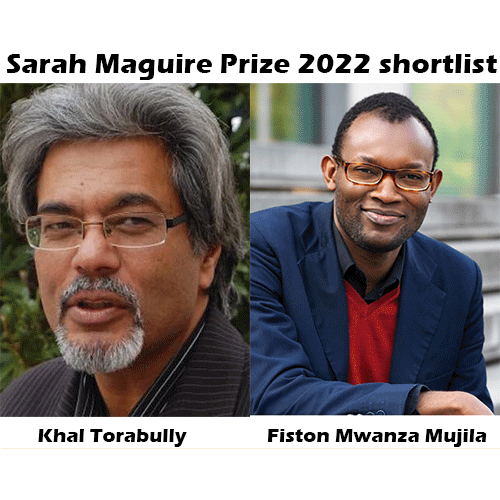
View On WordPress
0 notes
Photo
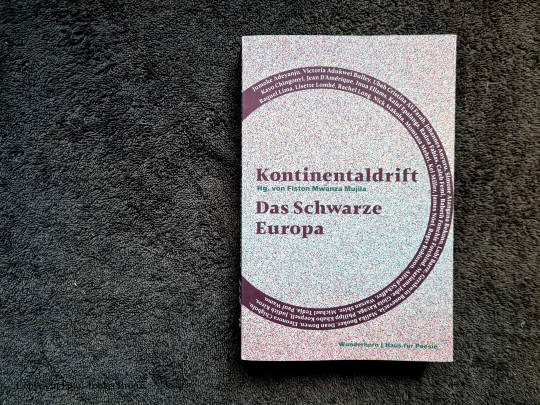
so voller poesie dieses buch namens kontinentaldrift auch ist, so sehr geht dem einband diese poesie ab... ein im endeffekt nichtssagender einband, der scheinbar absolut verschweigen will, dass man im innern auch verzaubert werden kann. leider wirkt dieser fast wie der deckel für einen behördlichen lagebericht... aber bitte bei diesem buch nicht auf das äußere achten - hier zählen ganz eindeutig die inneren werte!
#kontinentaldrift#das schwarze europa#fiston mwanza mujila#philotypen#wunderhorn#verlag das wunderhorn#haus für poesie#gedichte#prosa#tobias bruns#philosophenstreik#kritik#rezension#literatur
0 notes
Text
21 Books in Translation by BIPOC (Black, Indigenous and People of Color) Authors
Every month Book Club for Masochists: A Readers’ Advisory Podcasts chooses a genre at random and we read and discuss books from that genre. We also put together book lists for each episode/genre that feature works by BIPOC (Black, Indigenous, & People of Colour) authors. All of the lists can be found here. This is our retrospective book list for Episode 006 - Books in Translation.
Mama Hissa's Mice by Saud Alsanousi, translated by Sawad Hussain (Arabic)
Mirror of the Darkest Night by Mahasweta Devi, translated by Shamya Dasgupta (Bengali)
Invisible Planets: An Anthology of Contemporary Chinese SF in Translation, edited and translated by Ken Liu (Chinese)
Beijing Comrades by Bei Tong, translated by Scott E. Myers (Chinese)
The Enlightenment of the Greengage Tree by Shokoofeh Azar, translated by Anonymous (Farsi)
Ru by Kim Thúy, translated by Sheila Fischman (French)
Tram 83 by Fiston Mwanza Mujila, translated by Roland Glasser (French)
Three Strong Women by Marie NDiaye, translated by John Fletcher (French)
Last Night in Nuuk by Niviaq Korneliussen, translated by Anna Halager (Greenlandic/Danish)
Beauty Is a Wound by Eka Kurniawan, translated by Annie Tucker (Indonesian)
Beyond Babylon by Igiaba Scego, translated by Aaron Robertson (Italian)
Kim Jiyoung, Born 1982 by Cho Nam-Joo, translated by Jamie Chang (Korean)
Your Republic is Calling You by Young-Ha Kim, translated by Chi-Young Kim (Korean)
The Lonesome Bodybuilder by Yukiko Motoya, translated by Asa Yoneda (Japanese)
Ghachar Ghochar by Vivek Shanbhag, translated by Srinath Perur (Kannada)
The Sun on My Head by Geovani Martins, translated by Julia Sanches (Portugese)
Good Morning Comrades by Ondjaki, translated by Stephen Henighan (Portugese)
Time Commences in Xibalbá by Luis de Lión, translated by Nathan C. Henne (Spanish)
La Bastarda by Trifonia Melibea Obono, translated by Lawrence Schimel (Spanish)
Poonachi: Or the Story of a Black Goat by Perumal Murugan, translated by N. Kalyan Raman (Tamil)
Doomi Golo: The Hidden Notebooks by Boubacar Boris Diop, translated by Vera Wülfing-Leckie and El Hadji Moustapha Diop (Wolof/French)
33 notes
·
View notes
Text
january reading wrap-up
this month i got through THREE whole books, which is way more than i planned or expected. one book was for school & two were off my bookshelf. i also got a public library card for my new neighborhood, so i’m excited to have more options.
the reviews below are all spoiler free and a brief summary of my thoughts on each book. i’ll also post what i’m reading next at the bottom! if there’s anything you want to see in the future or something you think i could do better, let me know xx
book 1 / the big truck that went by jonathan katz
★★★★☆
i read this book for class, but it was very well written and gave a lot of good information. the author is a journalist who was in haiti during the 2010 earthquake and the attempts to rebuild the country afterwards. he’s very critical of international donors (with good reason) and provides an excellent firsthand account into what the relief on the ground looked like. the writing is great and very easy to follow and understand. definitely recommend it if you’re interested in the topic!
book 2 / erotic stories for punjabi widows by balli kaur jaswal
★★★★☆
this book was so fun to read and i really enjoyed the story. the plot follows nikki, who is the black sheep of her indian immigrant family and ends up teaching an english class to widows in the sikh community. there’s a little bit of mystery, a lot of heart, and a lot of very funny moments. there are some smutty scenes scattered throughout (as the title suggest), but they’re not necessary to read if it’s not your thing. the characters were really well-developed and i connected with them a lot. there were a couple parts of the plot that seemed a little underdeveloped, which is why i gave it 4 instead of 5 stars, but it didn’t detract from the overall story and i still definitely recommend it if you’re looking for something fun and light. it’s also optioned for a movie, and i can’t wait to see it when it comes out.
book 3 / tram 83 by fiston mwanza mujila (translated by roland glasser)
★★★☆☆
i wanted to love this book so much, especially because it’s critically acclaimed (shortlisted for the prix de monde) and has a really intriguing plot summary. it follows two childhood friends in an unnamed african city and the interesting characters they meet at the local night club, tram 83. i really enjoyed the prose, world-building, and development of the characters. the author has a really unique style that captures the frenetic energy of the setting. however, i found the plot under explained and difficult to follow at times, which took away from being immersed in the world. i think i would appreciate it more if i read it a couple more times. it’s not a book for everyone, but if you’re looking to branch out and read something out of your comfort zone, this might be a good pick. i definitely want to check out more from the author in the future.
next books on my list are dead mountain by donnie eichar & eleanor of aquitaine by marion meade! let me know if you have any recommendations for this month & what you’re planning to read xx
#virgo-diaries#studyblr#bookblr#reading#books#gradblr#resolutions#january#what im reading#student#book review#review#tbr
7 notes
·
View notes
Text
Tram 83, a soundtrack

“Africa Is a Country Radio continues its literary theme for its third season on Worldwide FM. The third installment in our theme of African literature is inspired by the debut novel from Fiston Mwanza Mujila, Tram 83. The story takes place in the fictional City-State, a resource rich secessionist state in central Africa. ... These are places that have also influenced my own musical tastes. So, as a dedication to all the central places of gathering at or of the global margins around the world, I present Tram 83, a soundtrack.Listen below, get the tracklist on Worldwide FM and follow us on Mixcloud.”
Africa Is a Country (Audio)
W - Fiston Mwanza Mujila
0 notes